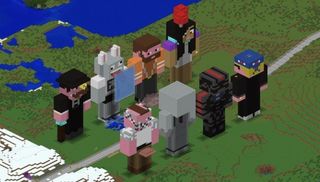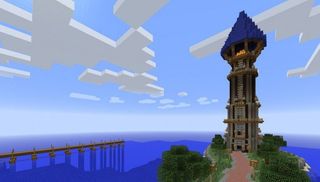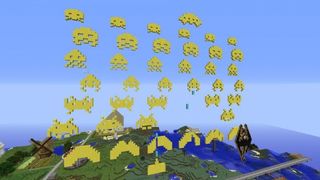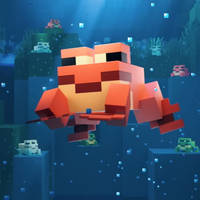Why Minecraft's new EULA is good for the game

At the start of the month, Mojang developer Erik "Grum" Broes reiterated to server owners that charging Minecraft players for perks was against the rules of its end-user agreement. It sparked a vocal backlash from the community—particularly the moderators and patrons of the game's largest servers. Shortly after, Mojang officially updated the rules around server monetisation —relaxing certain criteria, but expressly forbidding the selling of non-cosmetic game features. Eventually, Notch stepped in, defending himself from criticisms of being " literally worse than EA ".
Clearly then, Mojang's response hasn't placated the largest communities in the Minecraft multiplayer scene. So is there any validity to their concerns? I've rounded up some of the arguments for and against the new EULA, and have emerged largely in agreement with Mojang's plans. Let me explain why.
"...we don't want our players to be exploited or to have a frustrating time unless they pay."
This, from Mojang's round-up of the new rules, is the central point at the heart of the whole affair. It's why they've now introduced these rules. As Notch wrote in his blog post, "I don't even know how many emails we've gotten from parents, asking for their hundred dollars back their kid spent on an item pack on a server we have no control over."
A key word in that statement: "parents". Minecraft appeals to a large and broad audience, and kids comprise a significant part of its popularity. It's why silly YouTube antics grow into successful businesses, and why teachers can find such value in the game as a tool for education .
For all the things kids are good at, they haven't built up that healthy cynicism and disdain for the worst of microtransaction methods . And server operators are capitalising on that enthusiasm. Presented with a tiered game system; shown the people having more fun with their extra toys, kids are naturally going to want to join in—even if it means spending money.

"The F2P space for kids is unfortunately a highly predatory one," says Björn Jeffery, CEO and cofounder of children's developer Toca Boca, in Polygon's excellent exploration of the effects of free-to-play on children. "There are a lot of developers doing things they must know and feel are not the right things to do. It is predatory, and it is lucrative." The same can be true of the most exploitative of Minecraft servers.
PC Gamer Newsletter
Sign up to get the best content of the week, and great gaming deals, as picked by the editors.
This exploitation isn't aimed at a small cadre of shady predators. It applies to some of the largest servers in the community, as PCGamesN recently revealed . From a list of the game's most popular servers , they found paid-for weapons, paid-for unbannings and paid-for currency—all unlocked with real-world money.
"Mojang has for years given encouragement and permission to develop and operate custom gameplay experiences financed through fair revenue models."
This is a popular argument—one posed in Mineplex director Sterling's open letter to Notch —that implies Mojang are somehow changing their minds and are now being more restrictive with their rules around monetisation. And there's truth to that. Under Minecraft's old EULA all server monetisation was illegal, but Mojang never publicly enforced it. As a result, server monetisation became normal and server owners assumed that all would be fine.
But inaction isn't the same as encouragement, and I can't find any examples of Mojang previously supporting server monetisation. More than that, I find this a strange argument. Mojang did nothing, and while it benefited the community in some areas, it also led to predatory practices. That doesn't mean the status quo was right, but that Mojang were wrong. If anything, they should be condemned for waiting this long to step in; for allowing pay-to-win practices to pervade the multiplayer portion of their game for so long.
<a href="https://www.pcgamer.com/best-minecraft-seeds/" data-link-merchant="pcgamer.com"">Minecraft seeds: Fresh new worlds
<a href="https://www.pcgamer.com/best-minecraft-texture-packs/" data-link-merchant="pcgamer.com"" data-link-merchant="pcgamer.com"">Minecraft texture packs: Pixelated
<a href="https://www.pcgamer.com/the-best-minecraft-skins/" data-link-merchant="pcgamer.com"" data-link-merchant="pcgamer.com"" data-link-merchant="pcgamer.com"">Minecraft skins: New looks
<a href="https://www.pcgamer.com/best-minecraft-mods/" data-link-merchant="pcgamer.com"" data-link-merchant="pcgamer.com"" data-link-merchant="pcgamer.com"" data-link-merchant="pcgamer.com"">Minecraft mods: Beyond vanilla

"Large server networks are incredibly expensive to run."
Kotaku spoke to Matt Sundberg of the Shotbow network, who explained the expense of running these large servers. According to Sundberg, "most large networks run hundreds of Minecraft servers, along with enterprise DDOS protection, databases, dedicated proxies, and web infrastructure. In addition to that, many employ full time staff to manage the hundreds of hours of labor required for server maintenance and plugin development."
There's no doubt that a lot of servers will have to make some expensive changes—and some won't survive. But others will thrive. Mojang haven't banned server monetisation. In fact, they're now allowing it. The difference is that they're doing so within a limited set of situations. Server owners can charge for purely cosmetic items, and are allowed to enable advertising. They can even charge for access, as long as that charge applies to every member.
Within those restrictions, servers have the tools to guarantee their own survival—the same tools that server networks for other games have been utilising for years. More importantly, it's a set of tools that—as much as is possible while still allowing big servers to exist—limits the potential damage of microtransactions by removing the possibility of pay-to-win bullshittery.
"If servers only charge for cosmetic items, then the focus of their development is going to be on cosmetic items."
Sterling again . He continues by saying, "the value of our networks has always been that we have brought unique, interesting, and engaging gameplay content to Minecraft. This will harm the servers who won't be able to bring in enough income, the YouTubers who will lose new content to play on for their subscribers, and the players who will have less interesting games to play."
Here I'm slightly confused by the argument. If the value of your network is that it offers a unique experience, that won't change with the new EULA. Cosmetic items shouldn't reduce the innovation of multiplayer mini-games and mods, as they're what bring people to the servers. People aren't joining a multiple-thousand strong community to pay real-world money, but to play Hunger Games, or Ironfall, or GTA Minecraft.
Cosmetic items in free-to-play games don't replace the need for new and interesting content. Why would the same not be true of Minecraft?

"Mojang is destroying the community."
The #SaveMinecraft hashtag is full of people desperately fearful for the game's future. And that's because I'm wrong. Sort of.
I see Minecraft in the same way I see any other game with a multiplayer community. Which is to say, I see it differently to how the Minecraft community do. For me, Minecraft is the creation of Mojang, and so the game is theirs to define and control.
But for the community, it's as much their game. According to Matt Sundberg, the Shotbow network employ three full-time and five part-time staff. People have built businesses out of Minecraft. People's jobs are dependant on Minecraft. The community, more than most other games, feel entitled to it, because they see themselves as being the reason for its success.
From my perspective, if the most popular servers close, Minecraft will continue to function as normal. Meanwhile, the server operators—and many of their fans—see the game's continued popularity as hinging on their existence.
Ultimately it's this clash of wills that makes it a complicated philosophical issue, which is why Mojang are falling back on the legal one. Like it or not, they're the owners of Minecraft. That's an uncomfortable truth for those who've built their livelihoods from the game.

Phil has been writing for PC Gamer for nearly a decade, starting out as a freelance writer covering everything from free games to MMOs. He eventually joined full-time as a news writer, before moving to the magazine to review immersive sims, RPGs and Hitman games. Now he leads PC Gamer's UK team, but still sometimes finds the time to write about his ongoing obsessions with Destiny 2, GTA Online and Apex Legends. When he's not levelling up battle passes, he's checking out the latest tactics game or dipping back into Guild Wars 2. He's largely responsible for the whole Tub Geralt thing, but still isn't sorry.
Most Popular


